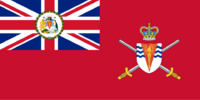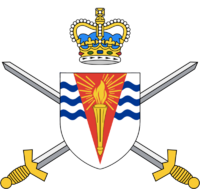Antarctic Circle States Army: Difference between revisions
No edit summary |
No edit summary |
||
| Line 88: | Line 88: | ||
{{Further information|List of Antarctic Circle States Army Corps}} | {{Further information|List of Antarctic Circle States Army Corps}} | ||
Army Headquarters is located in McMurdo, [[Erebus]], and is responsible for providing forces at operational readiness for employment by the armed forces' operational commands. The command structure is hierarchical, with overall command residing with the Army Commanding General, who is immediately subordinate to Minister of Defence, the head of the Antarctica Armed Forces. Army Headquarters is further organised into nineteen corps, each commanded by a brigadier general. On the other hand, the deployable units are organised into brigades, which themselves consist of a complex mix of smaller units such as battalions. The A.C.S. Army currently fields | Army Headquarters is located in McMurdo, [[Erebus]], and is responsible for providing forces at operational readiness for employment by the armed forces' operational commands. The command structure is hierarchical, with overall command residing with the Army Commanding General, who is immediately subordinate to Minister of Defence, the head of the Antarctica Armed Forces. Army Headquarters is further organised into nineteen corps, each commanded by a brigadier general. On the other hand, the deployable units are organised into brigades, which themselves consist of a complex mix of smaller units such as battalions. The A.C.S. Army currently fields six full-time 'regular' brigades, and three part-time territorial brigades. | ||
=== Special Forces === | === Special Forces === | ||
| Line 104: | Line 104: | ||
|- | |- | ||
| Army Forces Command | | Army Forces Command | ||
| | | Maj. Gen. TBD | ||
| TBD, TBD | | TBD, TBD | ||
| * Administrate all active combat units within the Army | | * Administrate all active combat units within the Army | ||
|- | |- | ||
| Special Operations Command | | Special Operations Command | ||
| Line 117: | Line 112: | ||
| TBD, TBD | | TBD, TBD | ||
| * Manage selection and training of special forces personnel<br>* Administrate special operations units within the Army | | * Manage selection and training of special forces personnel<br>* Administrate special operations units within the Army | ||
|- | |- | ||
| Training and Doctrine Command | | Training and Doctrine Command | ||
| Line 143: | Line 123: | ||
! Commander | ! Commander | ||
! Headquarters | ! Headquarters | ||
|- | |- | ||
| 1st Brigade | | 1st Brigade | ||
| Bde. Gen. William Edwards Jr.<br>Col. Michael Huxley | | Bde. Gen. William Edwards Jr.<br>Col. Michael Huxley | ||
| TBD, TBD | | TBD, TBD | ||
|- | |- | ||
| 2nd Brigade | | 2nd Brigade | ||
| Bde. Gen. Jim Osborne<br>Col. Robert Dalton | | Bde. Gen. Jim Osborne<br>Col. Robert Dalton | ||
| TBD, TBD | | TBD, TBD | ||
|- | |- | ||
| 3rd Brigade | | 3rd Brigade | ||
| Bde. Gen. TBD<br>Col. TBD | | Bde. Gen. TBD<br>Col. TBD | ||
| TBD, TBD | | TBD, TBD | ||
| | |- | ||
| 7th (Artillery) Brigade | |||
| Bde. Gen. TBD<br>Col. TBD | |||
| TBD, TBD | |||
|- | |||
| 8th (Combat Support) Brigade | |||
| Bde. Gen. TBD<br>Col. TBD | |||
| TBD, TBD | |||
|- | |||
| 9th (Sustainment) Brigade | |||
| Bde. Gen. TBD<br>Col. TBD | |||
| TBD, TBD | |||
|- | |- | ||
!colspan="4"|Territorial Brigades | !colspan="4"|Territorial Brigades | ||
| Line 165: | Line 153: | ||
| Bde. Gen. TBD<br>Col. TBD | | Bde. Gen. TBD<br>Col. TBD | ||
| TBD, TBD | | TBD, TBD | ||
|- | |- | ||
| 5th Brigade | | 5th Brigade | ||
| Bde. Gen. TBD<br>Col. TBD | | Bde. Gen. TBD<br>Col. TBD | ||
| TBD, TBD | | TBD, TBD | ||
|- | |- | ||
| 6th Brigade | | 6th Brigade | ||
| Bde. Gen. TBD<br>Col. TBD | | Bde. Gen. TBD<br>Col. TBD | ||
| TBD, TBD | | TBD, TBD | ||
|} | |} | ||
Revision as of 05:34, 30 April 2023
This article is incomplete because it is pending further input from participants, or it is a work-in-progress by one author. Please comment on this article's talk page to share your input, comments and questions. Note: To contribute to this article, you may need to seek help from the author(s) of this page. |
| Antarctic Circle States Army | |
|---|---|
| Founded | 1 January 1905 |
| Country | |
| Type | Army |
| Size | 16,854 (Regular) 19,107 (Reserve) |
| Motto(s) | Pro Rege et Patria |
| Engagements | Second Boer War First World War Second World War Korean War Melayu Emergency Singosari Confrontation Second Melayu Emergency Gulf War 1999 East Timorese crsis 2006 East Timorese crisis Regional Assistance Mission to Solomon Islands Kolmhark War Niagaran Civil War |
| Commanders | |
| Commander-in-chief | David C. Freeman |
| Minister of Defence | Kenneth Z. Miller |
| Chief of General Staff | Admiral James H. Katz |
| Army Commanding General | Lieutenant General Douglas A. Wright |
| Army Deputy Commander | Major General Darragh L. Camden |
| Insignia | |
| Antarctican Army Flag |  |
The A.C.S. Army is the principal land warfare force of Antarctic Circle States, a part of the Antarctica Armed Forces along with the Antarctican Navy, the Antarctican Air Force, and the Antarctica Polar Exploration Corps. The Army is commanded by the Army Commanding General (ACG), who is subordinate to the Minister of Defence, who commands the A.C.S. Armed Forces. The ACG also answers to the Chief of the General Staff (CGS)
Formed in 1905, as the Antarctic Auxiliary Force, through the merging of several colonial militia forces of Antarctica. The Antarctican Army was initially made up of a few small units of professional soldiers, where the vast majority were in Territorial Defence Force (TDF) during peacetime. Following the outbreak of WWI, a standing regular army was formed in 1914 to send large numbers of soldiers to serve overseas.
During its history, the Antarctican Army has fought in a number of major wars, including the Second Boer War, the First and Second World Wars, Korean War, Malayan Emergency, Indonesia-Malaysia Confrontation, Gulf War, and more recently in Iraq. Although Antarctican soldiers have been involved in a number global conflicts, Antarctican territory has never come under direct attack. Since 1949, the Australian Army has also been involved in many peacekeeping operations, usually as part of the United Nations. Today, it participates in multilateral and unilateral military exercises and provides emergency disaster relief and humanitarian aid in response to domestic and international crises.
History
Formation
World War I

Interbellum
World War II
North Africa
Europe
Pacific
Cold War
Postwar
Counterinsurgency
and
Late Cold War
Recent History (1991-present)
Gulf War
Peacekeeping
War On Terror
Structure and Organisation
Army Headquarters is located in McMurdo, Erebus, and is responsible for providing forces at operational readiness for employment by the armed forces' operational commands. The command structure is hierarchical, with overall command residing with the Army Commanding General, who is immediately subordinate to Minister of Defence, the head of the Antarctica Armed Forces. Army Headquarters is further organised into nineteen corps, each commanded by a brigadier general. On the other hand, the deployable units are organised into brigades, which themselves consist of a complex mix of smaller units such as battalions. The A.C.S. Army currently fields six full-time 'regular' brigades, and three part-time territorial brigades.
Special Forces
The A.C.S. Army contributes two of the three special forces groups to the Antarctica Special Forces Command: the Antarctic Circle States Special Air Service (AQSAS) and the Antarctic Light Infantry. The AQSAS consists of one regular regiment and has its headquarters at TBD, TBD, TBD. It consists of 4 regular squadrons (A, B, C, and E), a reserve squadron (D), and a training wing.
Levels of Command
| Army Commands | |||
|---|---|---|---|
| Name | Current Commander | Headquarters | Responsibilities |
| Army Forces Command | Maj. Gen. TBD | TBD, TBD | * Administrate all active combat units within the Army |
| Special Operations Command | Bde. Gen. TBD | TBD, TBD | * Manage selection and training of special forces personnel * Administrate special operations units within the Army |
| Training and Doctrine Command | Bde. Gen. TBD | TBD, TBD | * Manage recruitment, training and education of military personnel * Assist Ministry of Defence with development of ground-based tactics and strategies |
| Regular Brigades | |||
| Name | Commander | Headquarters | |
| 1st Brigade | Bde. Gen. William Edwards Jr. Col. Michael Huxley |
TBD, TBD | |
| 2nd Brigade | Bde. Gen. Jim Osborne Col. Robert Dalton |
TBD, TBD | |
| 3rd Brigade | Bde. Gen. TBD Col. TBD |
TBD, TBD | |
| 7th (Artillery) Brigade | Bde. Gen. TBD Col. TBD |
TBD, TBD | |
| 8th (Combat Support) Brigade | Bde. Gen. TBD Col. TBD |
TBD, TBD | |
| 9th (Sustainment) Brigade | Bde. Gen. TBD Col. TBD |
TBD, TBD | |
| Territorial Brigades | |||
| 4th Brigade | Bde. Gen. TBD Col. TBD |
TBD, TBD | |
| 5th Brigade | Bde. Gen. TBD Col. TBD |
TBD, TBD | |
| 6th Brigade | Bde. Gen. TBD Col. TBD |
TBD, TBD | |
Personnel
Strength
Rank and insignia
Uniforms
| Pay Grade | OP1 | OP2 | OP3 | |
|---|---|---|---|---|
| Insignia | 
|

|

| |
| Title | Warrant Officer | Chief Warrant Officer |
Master Chief Warrant Officer | |
| Abbreviation | W-1 | W-2 | W-3 | |



















